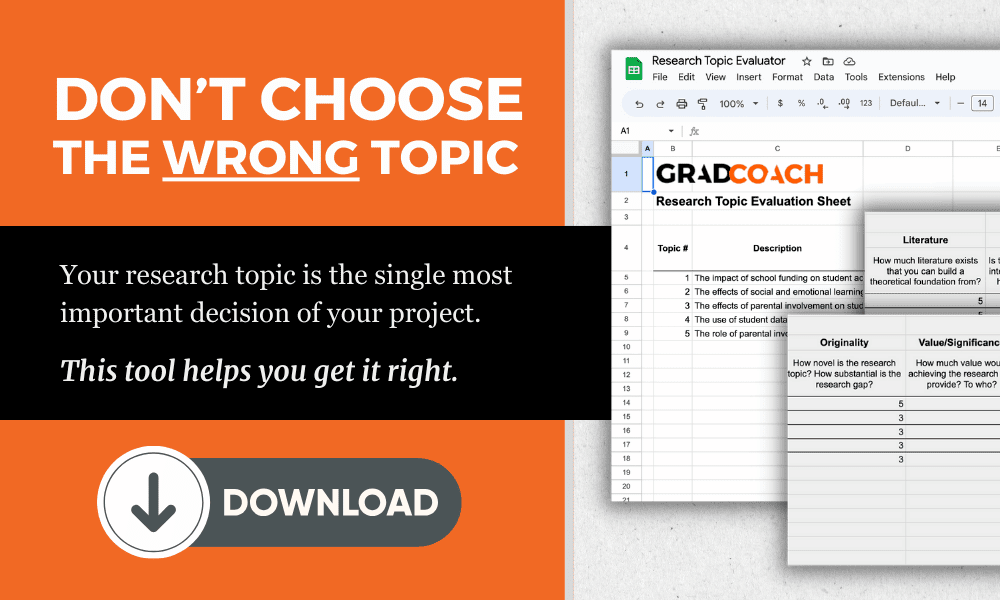How To Choose The Right Topic
By: Derek Jansen (MBA) | Expert Reviewer: Dr Eunice Rautenbach | April 2024

Overview: The “Big 5” Key Criteria
Criterion #1: Originality & Novelty
As we’ve discussed extensively on this blog, originality in a research topic is essential. In other words, you need a clear research gap. The uniqueness of your topic determines its contribution to the field and its potential to stand out in the academic community. So, for each of your prospective topics, ask yourself the following questions:
- What research gap and research problem am I filling?
- Does my topic offer new insights?
- Am I combining existing ideas in a unique way?
- Am I taking a unique methodological approach?
To objectively evaluate the originality of each of your topic candidates, rate them on these aspects. This process will not only help in choosing a topic that stands out, but also one that can capture the interest of your audience and possibly contribute significantly to the field of study – which brings us to our next criterion.
Criterion #2: Value & Significance
Next, you’ll need to assess the value and significance of each prospective topic. To do this, you’ll need to ask some hard questions.
- Why is it important to explore these research questions?
- Who stands to benefit from this study?
- How will they benefit, specifically?
By clearly understanding and outlining the significance of each potential topic, you’ll not only be justifying your final choice – you’ll essentially be laying the groundwork for a persuasive research proposal, which is equally important.
Criterion #3: Access to Data & Equipment
Naturally, access to relevant data and equipment is crucial for the success of your research project. So, for each of your prospective topic ideas, you’ll need to evaluate whether you have the necessary resources to collect data and conduct your study.
Here are some questions to ask for each potential topic:
- Will I be able to access the sample of interest (e.g., people, animals, etc.)?
- Do I have (or can I get) access to the required equipment, at the time that I need it?
- Are there costs associated with any of this? If so, what are they?
Keep in mind that getting access to certain types of data may also require special permissions and legalities, especially if your topic involves vulnerable groups (patients, youths, etc.). You may also need to adhere to specific data protection laws, depending on the country. So, be sure to evaluate these aspects thoroughly for each topic. Overlooking any of these can lead to significant complications down the line.
Criterion #4: Time Requirements & Implications
Naturally, having a realistic timeline for each potential research idea is crucial. So, consider the scope of each potential topic and estimate how long each phase of the research will take — from literature review to data collection and analysis, to writing and revisions. Underestimating the time needed for a research project is extremely common, so it’s important to include buffer time for unforeseen delays.
Remember, efficient time management is not just about the duration but also about the timing. For example, if your research involves fieldwork, there may specific times of the year when this is most doable (or not doable at all). So, be sure to consider both time and timing for each of your prospective topics.
Criterion #5: Ethical Compliance
Failing to adhere to your university’s research ethics policy is a surefire way to get your proposal rejected. So, you’ll need to evaluate each topic for potential ethical issues, especially if your research involves human subjects, sensitive data, or has any potential environmental impact.
Remember that ethical compliance is not just a formality – it’s a responsibility to ensure the integrity and social responsibility of your research. Topics that pose significant ethical challenges are typically the first to be rejected, so you need to take this seriously. It’s also useful to keep in mind that some topics are more “ethically sensitive” than others, which usually means that they’ll require multiple levels of approval. Ideally, you want to avoid this additional admin, so mark down any prospective topics that fall into an ethical “grey zone”.
If you’re unsure about the details of your university’s ethics policy, ask for a copy or speak directly to your course coordinator. Don’t make any assumptions when it comes to research ethics!
I didn’t know if I was good enough.
See how Kelsee went from lost and confused to conquering her PhD.Key Takeaways
In this post, we’ve explored how to choose a research topic using a systematic approach. To recap, the “Big 5” assessment criteria include:
- Topic originality and novelty
- Value and significance
- Access to data and equipment
- Time requirements
- Ethical compliance
Be sure to grab a copy of our free research topic evaluator sheet here to fast-track your topic selection process. If you need hands-on help finding and refining a high-quality research topic for your dissertation or thesis, you can also check out our private coaching service.
Don't Stop Now - There's More ✨

Qualitative Research Basics: The 20,000-Foot View
New to qualitative? Learn about the four key phases of the qualitative research process: data collection, coding, analysis, and writing.

How To Choose The Right Qualitative Analysis Method
Not sure which qualitative analysis method to use? Learn how to choose the right method for your specific research project.

Reflexivity & Triangulation In Qualitative Research
Learn how reflexivity and triangulation help manage subjectivity in qualitative research by enhancing credibility and minimising bias.

Trustworthiness In Qualitative Research
Learn about the four pillars of trustworthiness in qualitative research: credibility, transferability, dependability, and confirmability.

How To Choose A Tutor For Your Dissertation
Hiring the right tutor for your dissertation or thesis can make the difference between passing and failing. Here’s what you need to consider.



i need guidance on the choise of research topic.
I need guidance on my research topic . Assessing the impacts of Tradition birth attendants in Safe motherhood
Am looking for a good research topic for my MBA Specializing in HRM
Am MBA student,with Malawi college of Accountancy(M.CA).
please assist me on how to come up with a research topic and
also how write properly so that it can be of positive benefit to
the community am serving.(i work for health college )
I need dissertation topics in Community Development. I also need help on research proposal.
Thanks!
I need help on research proposal
Hello I need help on choice of research topic in field of finance
Hello I need help on choice of research topic in field of artificial intelligence
I need choice the research topics in education
I need guidance on health care management dissertation and research proposals please.